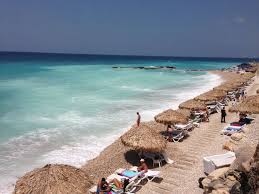
By
BEIRUT: While going to the beach is something that most people in the world take for granted, in Lebanon, it has become a luxury.
As expensive hotels and resorts take over most of the country’s coastline, Beirut’s last fishermen’s port is now a symbol for the battle for public spaces as activists and local fishermen fight to save coastal spots from being privatised.
Almost all of Lebanon’s coastline along the Mediterranean Sea has been privatised, and now one of its few remaining stretches of undeveloped coastal areas has come under threat.
For generations, Beirutis have enjoyed the natural seafront at the port of Dalieh, near the capital’s infamous Pigeon’s Grotto. But fishermen and activists are worried the area will soon be turned into another private beach resort.
Private developers bulldozed the port and fenced it off with barbed wire last year, evicting residents from their homes in the process. Omar Mahfouz belongs to one of 80 fishermen families who have lived in the area their whole life. He said their future is at stake.
"Ninety-five per cent of people who used to come down to the port, people who do sports here, do not anymore because they think it is closed,” said Mr Mahfouz.
A group of architects, academics and professionals under the Civil Campaign to Protect Dalieh has accused the government of amending building and zoning laws to profit from land that was once protected from development.
According to an activist from Nahnoo, an NGO that works for the protection of Lebanese public spaces, the lack of law enforcement and weak governments during and after the Lebanese Civil War 25 years ago have enabled corrupt developers to build resorts along most of the country’s 220-kilometre coast.
Many of them are illegal – built on public land by private developers, most of whom neither pay rent nor taxes. There are more than 2,000 illegal constructions along the shoreline, according to Mohammad Ayoub, executive director of Nahnoo.
He said: "Public space is essential to build social cohesion, to build an identity, break stereotypes, to have a dialogue, to breathe, to have better health. Imagine living in a country where you can’t access the beach.”
Some of the property owners also charge the public up to US$30 to access beaches they do not rightfully own.
However, efforts to stop illegal coastal construction do not stop in Beirut. In Jounieh, a city 15 kilometres north of the capital, its mayor has been fighting a similar uphill battle.
"Jounieh used to have five kilometres of sandy beaches,” said Antoine Frem, Mayor of Jounieh. “We are only left with half a kilometre of sandy beaches, which is also not accessible because it is private property. We are depriving the public from access to the sea. This is something that is against social justice."
The fight to protect public access to the country’s shoreline looks to be a long one. Activists lament that this is because many of the resorts belong to politicians and developers with powerful government connections.
However, as they continue to pressure authorities to clamp down on illegal building, for fishermen who have lost their income, it might be too late.
– CNA/yt



